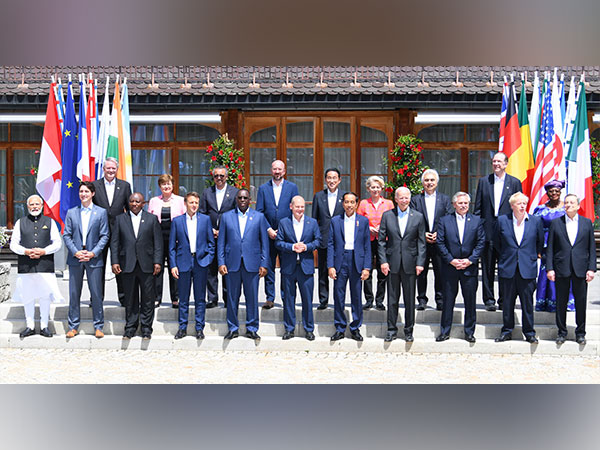
Schloss Elmau [Germany]: The Group of Seven (G7) leaders on Monday held discussions on the impact of Russia's war on food and energy supplies including the global economy and said the bloc is determined to support Ukraine in producing and exporting grain, oil, and other agricultural products as well as to address the causes of the evolving global food crisis.
They called upon Russia to cease, without condition, its attacks on agricultural and transport infrastructure and enable free passage of agricultural shipping from Ukrainian ports in the Black Sea.
"We are united and determined to strongly support Ukraine in producing and exporting grain, oil, and other agricultural products and we will foster coordinated initiatives that promote global food security and address the causes of the evolving global food crisis," the Group of Seven said in the statement on Monday.
In the G7 summit, leaders were in consensus that Russia bears enormous responsibility for rising threats to global food security as a result of the conflict.
"Russia's unprovoked assault on Ukraine - marked by bombing, blockades, and theft - has severely prevented Ukraine from exporting its agricultural products and is hampering its production capacity, leading to steep price rises and increasing global food insecurity for millions, especially those most vulnerable, such as women and children," the Group of Seven said in the statement.
"We urgently call on Russia to cease, without condition, its attacks on agricultural and transport infrastructure and enable free passage of agricultural shipping from Ukrainian ports in the Black Sea," they said.
Ukraine is the "breadbasket of Europe" supplying 10 per cent of the world's wheat, 12-17 per cent of the world's maize and half of the world's sunflower oil. Twenty-five million tonnes of corn and wheat - the entire annual consumption of all the least developed countries - can't be exported and is currently at risk of rotting in Ukrainian silos. This problem is due to worsen dramatically with July's harvest.
Russia's actions have driven up prices in countries like the UK and, while the UK is not directly dependent on Ukrainian grain exports, the ongoing blockade has placed 47 million people around the world on the brink of humanitarian disaster.
In addition to preventing grain from leaving Ukraine via the Black Sea - the route by which 96 per cent of Ukraine's grain has historically been exported, Russian attacks are disrupting rail exports.
Not only is Russia preventing Ukraine from exporting its grain, there is increasing evidence that Russia is stealing grain from Ukraine, smuggling it over the border to sell and boost Putin's war coffers.
The leaders also agreed to further strengthen Ukraine's resilience by expanding cooperation in intelligence and information sharing, information security, as well as maritime security.
"We will continue supporting Ukraine in defending its networks against cyber incidents and expand our cooperation in the fields of energy security, the safety and security of nuclear material and facilities, environmental, and water use issues," the statement added.
On the second day of the summit in Elmau, the main focus of the G7 heads of state and government will be continued support for Ukraine. On Sunday, the Chancellor welcomed the heads of state and government of the G7 to the summit under the German presidency.
"We are united by our view of the world. We are also united by our belief in democracy and the rule of law," said Chancellor Scholz at the beginning of the summit.
In a first working session on Sunday, the heads of state and government of the G7 discussed global economic issues.
"All G7 countries are concerned about the crises that are currently to be overcome -- falling growth rates in some countries, rising inflation, shortages of raw materials and disruption to supply chains. These are no small challenges and it is therefore important to share responsibility," said Scholz. (ANI)







